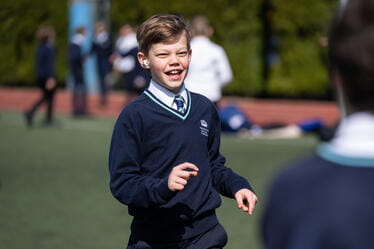The IB Learner Profile: A Tool of Stability in a World of Change COVID 19 (Coronavirus) has changed our world and reality, as we know it.
COVID 19 (Coronavirus) has changed our world and reality, as we know it.
Many students were forced last year and continue this year to study remotely. Other schools and universities are searching for various solutions to ensure that education continues, and teachers and students are adapting in numerous ways. We are lucky today that technology has made it possible to continue the educational process online and maintain communication between teachers and virtual classrooms.
While virtual learning may present many challenges, and does not substitute reality, it does offer IB students and teachers an opportunity that makes the most out of this experience. The IB Programme's structure, philosophy and learner profile can be seen as tools that teachers can use in maintaining educational focus and standards, despite all the challenges. The inquiry-based focus of the IB curriculum fosters creative methods that prepare students to face any learning obstacle that they may come across, COVID included. The emphasis on developing learning styles that meets the needs of each diverse student and encourages them to be lifelong learners, helps sustain the educational process with a variety of teaching and learning resources.
However, specifically the IB learner profile helps develop a variety of 21st century skills. Students who have these attributes are better equipped to continue learning under these new and challenging circumstances than non-IB students. The table below displays the learning attributes that students build while using the IB learner profile in these unique times.
The IB Learner Profile | Student developed Skills |
Inquiring | Students have a thirst for knowledge, curiosity and enthusiasm to research and explore. During virtual learning students have even more access to learn and adapt to challenges by using technology to facilitate their learning and research topics in more depth to provide greater understanding. |
Knowledgeable | Students can broaden their knowledge by pursuing new areas of information. Researching about their environment and local situations will help them both understand and deal with problems that arise from a new reality. |
Thinker | This attribute allows students to think through problems and find solutions without supervision. Students are provided with more opportunities to analyse and this gives them the opportunity to overcome any challenges and make good decisions. |
Communicator | Students find new and creative ways to communicate. Technology aids this attribute allowing students in isolation to build networks and connections with others. |
Principled | Students become more aware of critical circumstances and the need to continue their education. They realize the great efforts of teachers and schools in providing these opportunities and work responsibly to maintain this process. |
Open-minded | Students show a readiness to learn by applying virtual classroom tools and strategies, often in unfamiliar ways. They are willing to accept the challenges of innovation and display new learning methods. |
Caring | Students collaborate with other students and teachers. They will aid and support each other in the technical aspect of virtual learning. |
Risk-taker | Students are not afraid of change and use their skills as a way to deal with it. When learning in the virtual world, these students build resolve to face challenges positively and build self-reliance as a way to mitigate change. |
Balanced | Students pay attention to details, and understand that it is important to find a balance between screen time and exercise. They also develop skills to balance their emotional and physical needs which allows them to be more resilient. |
Reflective | Students review their strengths and weaknesses in order to identify what is important to them and where they need to focus their learning journey. |
Putting the learner profile at the centre of the educational process gives students the skills necessary to cope and succeed in this ever changing and dynamic world. While life may never be the same after COVID, the IB learner profile does present many excellent opportunities for both teachers and students to deal with the challenges we are currently facing and prepare them for those that will emerge in a post-COVID world.
Evelina Mroczkowska
Humanities Teacher
Head of Year 13






